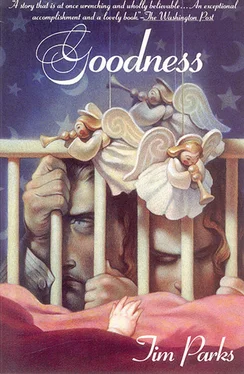Tim Parks - Goodness
Здесь есть возможность читать онлайн «Tim Parks - Goodness» весь текст электронной книги совершенно бесплатно (целиком полную версию без сокращений). В некоторых случаях можно слушать аудио, скачать через торрент в формате fb2 и присутствует краткое содержание. Год выпуска: 1994, Издательство: Grove Press, Жанр: Современная проза, на английском языке. Описание произведения, (предисловие) а так же отзывы посетителей доступны на портале библиотеки ЛибКат.
- Название:Goodness
- Автор:
- Издательство:Grove Press
- Жанр:
- Год:1994
- ISBN:нет данных
- Рейтинг книги:3 / 5. Голосов: 1
-
Избранное:Добавить в избранное
- Отзывы:
-
Ваша оценка:
- 60
- 1
- 2
- 3
- 4
- 5
Goodness: краткое содержание, описание и аннотация
Предлагаем к чтению аннотацию, описание, краткое содержание или предисловие (зависит от того, что написал сам автор книги «Goodness»). Если вы не нашли необходимую информацию о книге — напишите в комментариях, мы постараемся отыскать её.
, to get his life back on the rails again.
Goodness — читать онлайн бесплатно полную книгу (весь текст) целиком
Ниже представлен текст книги, разбитый по страницам. Система сохранения места последней прочитанной страницы, позволяет с удобством читать онлайн бесплатно книгу «Goodness», без необходимости каждый раз заново искать на чём Вы остановились. Поставьте закладку, и сможете в любой момент перейти на страницу, на которой закончили чтение.
Интервал:
Закладка:
Contemporary Civilisation
Those good years. I see myself bolting down my muesli, buttering my toast, showing variously-coloured season tickets to variously-coloured conductors, the 260, the 12, learning to leave the carcinogenic dregs at the bottom of tuppenny coffees at the office, staring and staring at the green Hew-Pack screen, exploring strings, sprites, double trip codes (my own invention), glancing up at the frenzied chase of polished metal on the North Circ, brushing lunchtime sandwich crumbs from the keyboard, studying on the bus on the way home (never a headache then), catching the nine o’clock news and the business programmes, studying and calculating away on my little IBM till midnight and gone, while Shirley maybe did the dishes, prepared lessons, read her art books, phoned friends, picked up the comedies she liked on the box. The neighbours across the hall invited us over for drinks sometimes, but we discouraged it; they were a sweet couple, Mark and Sylvia, both cheerful and very attractive physically, but hopelessly dumb. There was no future in it. You see that more or less immediately with some people. They felt they’d arrived in their two-bedroom Finchley flat, while we were only beginning our way up. No point in doing much more than waving to each other.
More willingly we went to parties, dances, when we got to hear of them. We still loved each other’s company, still shone in groups and enjoyed making a show of our happy relationship. Shirley would come and sit on my lap. We would get involved in friendly little tussles. You could sense people watching, envying. We had that off to a T. Or occasionally she cooked the most beautiful meals from French recipes to surprise dinner guests: Jill and Gregory, now resident in Hornsey, both in commercial insurance; Peggy, pregnant again (I didn’t even bother offering advice this time, you learn to recognise someone’s destiny after a while); and just every now and then Shirley’s younger brother Charles, one of your pink champagne lefties (Cambridge third in Philosophy) of uncertain sexual orientation and extraordinary belligerence; despite Daddy’s huge salary he had somehow wangled himself a council flat off the Goldhawk Road, which he referred to as ‘my pad’ and rarely slept in.
So we had these little treats, the odd evening in company. But mainly our life was just the glorious, as yet unsoured routine: the busy days, bus and office, the Mars bars, lager, Rothmans and Evening Standards , the steeply rising curve of my career, weekend purchases of consumer goods, Shirley’s teaching, parents’ evenings and school plays, on and on, day in day out, but brightly peppered with our always successful lovemaking, the pleasure at gloomy weekends of leafing through brochures to choose Mediterranean holidays we could now easily afford. Surely this was the good life, a triumph really of contemporary civilisation, busy young urban people, working hard, living well, faithful to each other, honest. It seemed that nothing was lacking. In my defence I think I can say that had it been allowed to go on this way, I would have been the last person to want to change anything.
Shortly after they took me up to eight grand, Mavis had a third shot at killing herself, and finally got it right: whole bottle of Disprin in the early hours and then the head in the oven for good measure. I felt a little sorry for my mother who would inevitably see this as another defeat and find cause to blame herself, but at the same time I couldn’t help feeling relieved that at least this weight had been taken off her shoulders.
Inevitably I was called in to deal with the practical side, the funeral arrangements. The difficulty here was to persuade Mother to go for a reasonably priced coffin and skip the rose tree bit at the crem which would have eaten up three months of her pension and would anyway have had to be shared with two other ‘cinderellas’, as Shirley rather quaintly put it. Likewise, when the back door was rotting away, when the fridge was faulty (occasionally defrosting itself all over the lino), when the bathroom window could never be properly shut because the wood had swollen, what on earth was the point of a wreath of pinks for mad Mavis? I did my best.
The surprise at the cremation, though, was that Grandfather cried. He said nothing, but tears streamed from his pulpy old eyes. Sitting next to him I put an arm round his thick back to comfort him and found him trembling with emotion. Foreseeing his own funeral was the only way I could explain it, for it is indeed awesome when the coffin suddenly slides away through black curtains and you know you will see that face (however unloved) never again; doubly awesome I suppose when you expect to be providing the object lesson yourself in the not too distant future.
It rained for the event. Peggy came late, in the last stages of gestation, accompanied by a tall blonde boy who may or may not have been the father. On trying to engage him in conversation he turned out to be Czech and spoke only the most broken English. Bob/Raschid had been informed but didn’t turn up, so that apart from the family there were only two rather mysterious spinster types in plastic macs who we eventually discovered were the other founder members of the Harrow branch of the Elvis Presley Fan Club. We let them take away the deceased’s record collection, rather generously I thought, since you never know how much that kind of stuff might be worth these days. Mavis had had no life insurance so there was no windfall to give the event any cheer, and after desultory conversation over coffee and digestives at Gorst Road everybody took their umbrellas and themselves off home.
In the Scirocco (disc brakes all round, electric windows), Shirley rather unexpectedly said: ‘I do feel sorry for your mother though.’ And over Tandoori chicken later, because we really had to get out of the house to brighten up, she said: ‘I wouldn’t mind you know if she got your Grandfather into a home now and came to live with us. She’s okay.’
‘No room,’ I explained promptly.
‘We won’t be where we are forever.’
I shook my head: ‘He’ll never go into a home. And so long as he’s in Gorst Road she’ll stay with him. Then you’re always saying how impossibly pious she is. Think, you’d have to stop swearing about the house, you’d. .’
‘It wouldn’t be the greatest of losses,’ she said coolly. ‘One grows out of swearing.’
Could she really be serious? When we had our lives so splendidly worked out already. ‘We’d have to cut out the quickies any time we felt like it.’ Had she thought about that?
‘That’s true, but I’ve always preferred the unabridged bedtime version myself.’
I stopped eating and looked at her, her long fine face, big, prominent eyes, the curve of character in her jaw, my good-looking if rather sinewy wife. ‘Come on, come on, Shirley! She’d always be reproaching us for not having children, you know what she’s like. Go forth and multiply, the Christian family, and so on.’
‘She’s never said a word about it to me,’ Shirley said, ‘in fact I’ve always thought her admirably sensitive on that point. My own mother’s much worse.’
‘But you can see the reproach in her eyes, for God’s sake. She doesn’t need to say anything. That’s the whole point about my mother; she is a reproach in herself.’
Shirley smiled. ‘Hasn’t it ever occurred to you, that the hang-up might be yours rather than hers, I mean, you imagine her reproaching you for things you feel guilty of anyway. You’ve substituted her for your conscience, it helps you to ignore it. You think, it’s her fault I’m feeling guilty, it’s just my stupid mum.’
‘Three cheers for psychoanalysis,’ I said brightly, filling my mouth with some fierce sauce or other. ‘Want to know what I dreamt last night?’
Читать дальшеИнтервал:
Закладка:
Похожие книги на «Goodness»
Представляем Вашему вниманию похожие книги на «Goodness» списком для выбора. Мы отобрали схожую по названию и смыслу литературу в надежде предоставить читателям больше вариантов отыскать новые, интересные, ещё непрочитанные произведения.
Обсуждение, отзывы о книге «Goodness» и просто собственные мнения читателей. Оставьте ваши комментарии, напишите, что Вы думаете о произведении, его смысле или главных героях. Укажите что конкретно понравилось, а что нет, и почему Вы так считаете.












